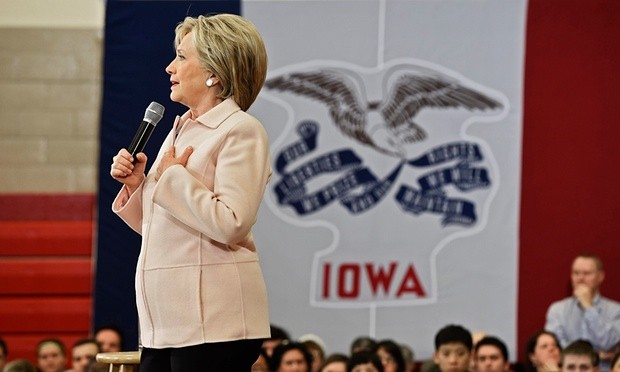U.S. government discovers “top secret” information in Clinton emails
State Department censors 22 emails after confirming for the first time that the Democratic frontrunner’s home server contained closely guarded secrets

The Guardian
The Obama administration confirmed for the first time on Friday that Hillary Clinton’s unsecured home server contained some of the US government’s most closely guarded secrets, censoring 22 emails with material demanding one of the highest levels of classification. The revelation comes just three days before the Iowa presidential nominating caucuses in which Clinton is a candidate.
The State Department will release its next batch of emails from Clinton’s time as secretary of state later Friday. But the Associated Press has learned seven email chains are being withheld in full because they contain information deemed to be “top secret”.
The 37 pages include messages recently described by a key intelligence official as concerning so-called “special access programs” – a highly restricted subset of classified material that could point to confidential sources or clandestine programs such as drone strikes or government eavesdropping.
Department officials wouldn’t describe the substance of the emails or say if Clinton sent any herself. They also wouldn’t disclose whether any of the documents reflected information that was classified at the time of transmission, but indicated that the agency’s Diplomatic Security and Intelligence and Research bureaus have begun looking into that question.
“The documents are being upgraded at the request of the intelligence community because they contain a category of top secret information,” State Department spokesman John Kirby told the AP, describing the decision to withhold documents in full as “not unusual”. That means they won’t be published online with the rest of the documents, even with blacked-out boxes.
Clinton, the frontrunner for the Democratic presidential nomination, has insisted she never sent or received information on her personal email account that was classified at the time. No emails released so far were stamped “CLASSIFIED” or “TOP SECRET”, but reviewers previously had designated more than 1,000 messages at lower classification levels for public release.
Friday’s will be the first at the top secret level.
For those that Clinton only read, and did not write or forward, she still would have been required to report classification slippages that she recognized. But without classification markings, that may have been difficult, especially if the information was in the public domain.
Kirby said the State Department’s focus as part of the Freedom of Information Act review of Clinton’s emails was on “whether they need to be classified today.” Questions about their past classification, he said, “are being, and will be, handled separately by the State Department”.
Possible responses for classification infractions include counseling, warnings or other action, State Department officials said, though they declined to say if these applied to Clinton or senior aides who’ve since left the department. The officials weren’t authorized to speak on the matter and spoke on condition of anonymity.
Friday’s release comes at an awkward time for Clinton. The Iowa caucuses are on Monday, and her main challenger, Vermont senator Bernie Sanders, is running neck and neck with her in the polls there and leads solidly in New Hampshire. Clinton still holds a strong advantage in national polls.
The emails have been an issue for Clinton’s campaign since it became known 10 months ago that she had exclusively used a nongovernment account linked to a home server while in office. Clinton first called the decision a matter of convenience and then termed it a mistake, even if doing so was not expressly forbidden.
Both Clinton and the State Department have said her account was never hacked or compromised, which security experts assess as unlikely, and that the vast majority of her emails were preserved properly for archiving purposes because she corresponded mainly with government accounts. They have backtracked from the archiving claim, while the AP discovered several phishing attempts on her server connected to Russia.
The FBI also is looking into Clinton’s email setup but has said nothing about the nature of its probe. Independent experts say it is highly unlikely that Clinton will be charged with wrongdoing, based on the limited details that have surfaced up to now and the lack of indications that she intended to break any laws.
It is the potential political costs that are probably of more immediate concern for Clinton. She has struggled in surveys measuring her perceived trustworthiness, and an active federal investigation, especially one buoyed by evidence that top secret material coursed through her account, could negate one of her main selling points for becoming commander-in-chief: her national security resume.
How to submit an Op-Ed: Libyan Express accepts opinion articles on a wide range of topics. Submissions may be sent to oped@libyanexpress.com. Please include ‘Op-Ed’ in the subject line.
- Libya’s HCS invites applicants for key state roles - December 31, 2023
- UK calls on Iran to prevent escalation in Israel-Hamas conflict - November 05, 2023
- Libyan Interior Minister: Immigrant shelter costs a fortune - November 05, 2023


